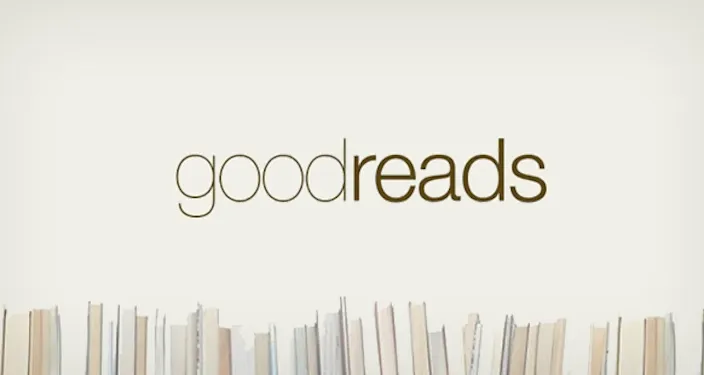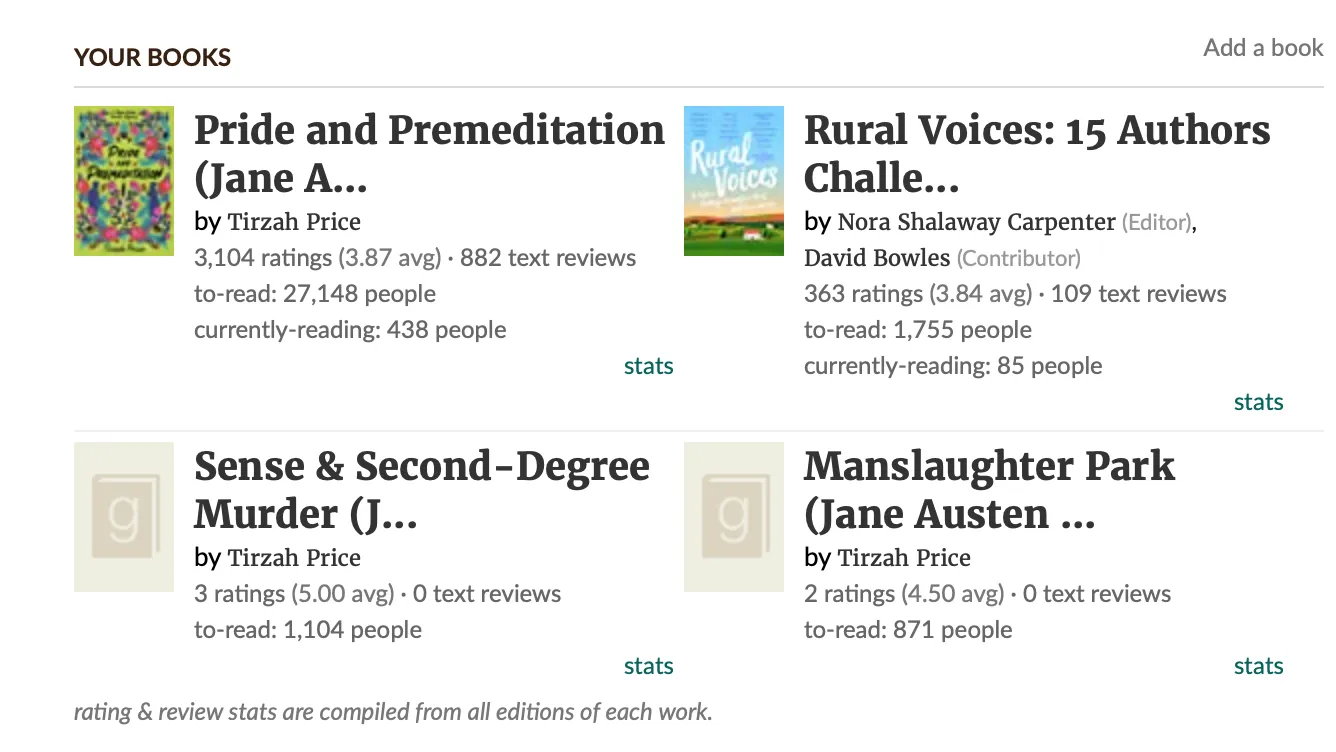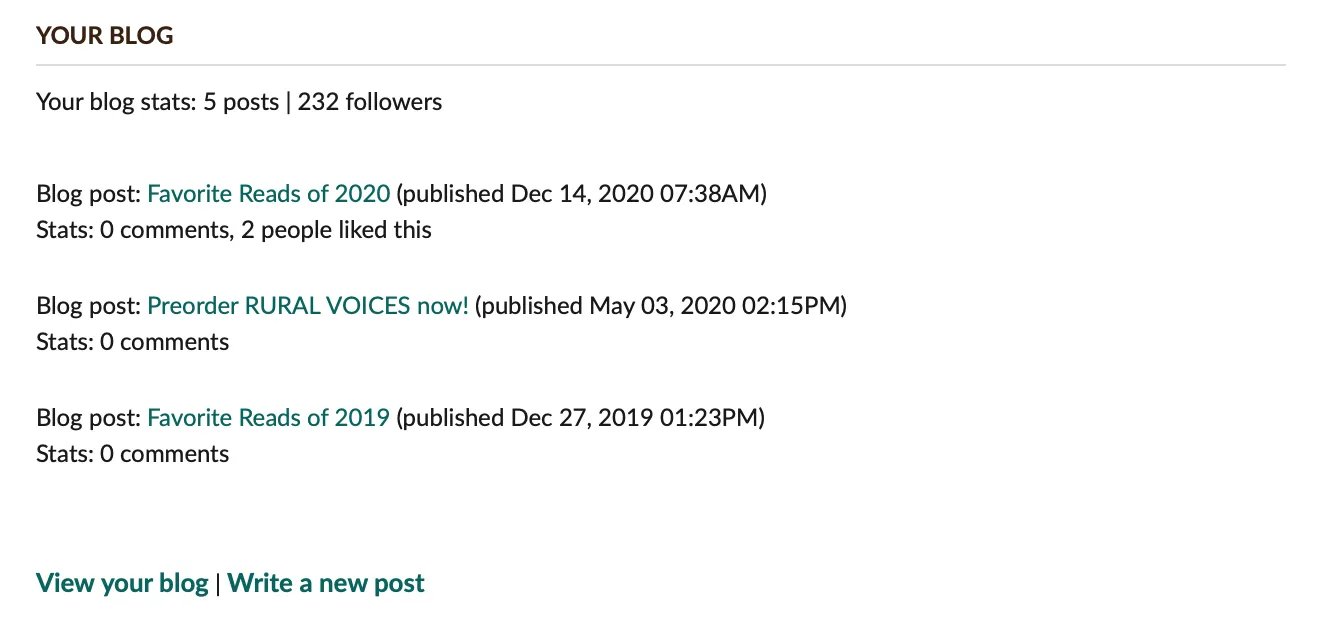
Authors Belong on Goodreads, Too
If you hang about in the book world, you won’t have to wait long before catching a whiff of some new publishing kerfuffle involving Goodreads. From authors responding to negative reviews to moderation issues stemming from users abusing the review feature, the platform — which is fairly outdated considering its popularity — is almost always at the center of some new book world drama. One general consensus seems to be that authors shouldn’t respond to reviews on Goodreads…and I agree. But I’ve seen many people take that a step further and say that authors don’t belong on Goodreads at all, and I want to push back on that, because as an author, I have found Goodreads to be a useful and informative tool in my career, and I know I’m not alone. Which raises the question: Can authors and readers peacefully coexist on Goodreads?
Why Are Authors On Goodreads?
For context, it might help to understand why authors are even on Goodreads in the first place when the first piece of advice authors receive upon selling a book is “Get off of Goodreads.” I think there is a fairly simple and straightforward answer: Authors are readers first. Many of us create accounts and start shelving, rating, and reviewing books before we begin to pursue publication seriously, or even start writing. Many of us enjoy the platform as users, and when the time comes that our own books are put up on the platform, we can “claim” our author accounts and a personal reader account becomes an author account. Which can be very weird, to say the least. Authors who don’t want their account history to be public have to mess with a lot of confusing privacy settings, just delete all of their shelves, ratings, and reviews, or create a dummy account with a different email that you then have to log in and out of in order to go between your personal reading shelves and the account with author features, which is frustrating and inconvenient.
How Do Authors Use Goodreads?
Contrary to popular opinion, authors don’t just use Goodreads to read reviews that readers post about their books. Goodreads has multiple affordances for authors that most users who are average readers probably aren’t aware of. These features make it easy for authors — traditionally published, self-published, or hybrid — to keep tabs on the information about their books, utilize promotion tools, and even identify audiences. I always recommend that authors claim their author account on Goodreads because it gives you control over what info about your books is presented (essential given the popularity of Goodreads) and because, call me paranoid, but I think authors should claim their accounts before someone else attempts to claim it for them.
When you claim your author account, you get access to an Author Dashboard, which lists stats and your works. To give you visual examples, I’ll be showing you my author dashboard view.
The first thing you see on the dashboard is a nice summary of your works, which include books you’ve authored or contributed to:

This summary shows the number of your works, how many users have added your works to their shelves, the total number of ratings and reviews, and the total number on the to-read shelf. It also includes some stats about books that you as an author have shelved or reviewed — as you can see, the number is low because I actually don’t use Goodreads outside of rating books I love in order to support my fellows authors.
Then, Goodreads offers more nitty gritty details on each work:

From the Your Books panel, we can see various works and a quick summary of star ratings, the number of text reviews, and the number of times a book has been shelved “to-read.” From this section, you can also add new books as they’re announced and even edit your book and series info. Sometimes erroneous info or multiple editions get added to Goodreads, and it can be helpful to have the authority to edit your books’ info or combine editions rather than seeking out a Goodreads librarian. There is a limit on what you can do, however, such as deleting certain information.

The Ask the Author feature on Goodreads is one big reason why authors might want to check in on Goodreads every so often. If an author chooses to do so, they can open their question box to readers, and even set guidelines about what questions they’ll answer. Readers can then ask authors questions (which does open them up to harassment, but that’s a conversation for a different day), and when the authors respond, their answer is posted publicly on their Author page. Considering that Goodreads is the largest book recommendations and review site on the internet, this is a pretty powerful way for authors to connect with readers and answer questions about their works. The questions authors answer have the potential to be much more visible on Goodreads than on an author’s personal website or social media.
An important note about Q&A’s: Goodreads also has a Q&A feature on each individual book’s page, but that is labeled “Reader Q&A.” While authors can respond to questions that are posted there, my understanding of the language and wording surrounding that feature is that it’s specifically for the Goodreads community. Readers might ask questions about content warnings, themes, and if there will be a sequel. I’ve seen authors respond to these questions, but many choose not to because they don’t want to intrude in a reader space. Questions submitted to the reader Q&A section of individual book listings do not get sent to the author’s dashboard, and authors don’t get notifications when those questions or responses to the questions are posted.

Another way that authors can connect with readers on Goodreads is through the blog function. The blog appears on the author’s public-facing page, and authors can either post blog posts directly on Goodreads via the “Write a new post” link, or they can link their personal blogs (hosted on their websites) to share the latest news and updates. This makes things really easy if authors want to post updates in one spot, but share widely.

Finally, authors can pay for advertising on Goodreads, and they can pay to promote giveaways of their books. Giveaways are a popular form of marketing because readers enter by adding the book to their to-read shelf. Once a book is on a reader’s to-read shelf, Goodreads auto-generates emails and notifications for that book and author. If you enter a Goodreads giveaway for a book that hasn’t released yet, you might get an email notification when it releases, or when the author releases a new book. One anonymous author I spoke to said that she felt more adds on Goodreads resulted in Goodreads promoting her book to readers even more, which has the advantage of “alerting” readers to the fact that this is a book they ought to pay attention to. These are all useful reasons why authors and publishers like to see high to-read numbers, and from personal experience, I can say that I saw the most to-read adds on my debut novel during the period that there were giveaways running. Authors can pay for giveaways and advertising themselves, or publishers pay for it. In my case, my publisher paid for these two giveaways of my first book, but I can see the details in the author dashboard, including how many people entered for each.
All of these tools are provided by Goodreads with the explicit purpose of being utilized. It behooves Goodreads to have authors on their platform, both financially and from a value standpoint, because author participating on the platform adds value to the readers, the main users. However, there are other ways that authors can also use Goodreads to better promote their books and reach audiences that require more legwork and strategy. One author I spoke to, who wished to remain anonymous, said she was surprised when her book, which is a Jewish YA historical novel not set during the Holocaust, found readership among older Christian women on Goodreads. This influenced how she approached her own marketing and how she set up Facebook ads. Another author said that she’s been approached by readers on Goodreads who have invited her to book club meetings, or online forums, which have led to more engagement and sales for her book.
All of the authors I spoke with talked about organic connections and surprising things they might have learned about their readers and their book’s reception. Authors like to say that once a book is released into the world, it’s not theirs anymore and it belongs to the reader. I think that’s true…but I also think that there is value in understanding how your book is being received, and Goodreads provides a point of connection. Without going into detail, I can say that certain reader impressions of and reactions to my first book surprised me, but they also had a direct influence on how I approached certain aspects of writing my third book, and I am grateful for this surprising redirection because I think it will help me grow as a writer, and hopefully satisfy readers.
How Far Is Too Far?
It’s impossible to talk about authors on Goodreads without addressing the obvious issue of authors who behave badly on the platform, or who speak poorly of reviewers on other platforms. I don’t condone abuse of any kind, and I think that authors have to be especially aware of the power imbalance between reviews and authors (even if many authors don’t feel as though they hold much power). Authors are the professionals in the room, and I would argue that while all Goodreads users can and should be held to a code of conduct that forbids abuse and harassment, the average Goodreads user isn’t a professional reviewer. They’re readers, and they’re entitled to their opinions and reactions, as negative or as hurtful as they might be to the author. Most authors understand this, I think, and most know that engaging with reviews on Goodreads is an exercise in futility. To take it a step further, I think engaging with Goodreads reviews both on and off the platform is inappropriate because that section of Goodreads isn’t for authors. Goodreads provides authors with plenty of affordances to engage with readers, if they choose — but leave the reviews to readers. (And it’s important to note that while some authors may only go to Goodreads to find 5-star reviews and share them as a promo tool, this is against Goodreads’ terms of service, and I would advise against it.)
Some authors do review their own books, which is a slightly different issue. Goodreads has helpfully tagged these reviews as “Review by the author” so this is transparent. I’ve seen some authors jokingly talk about five-starring their own book because they’re its first fan; other authors use it as a chance to share some background info about the work or highlight content warnings. I have no issue with authors who choose to do this in a professional manner, because Goodreads doesn’t have an easy way for authors to share on-topic information about an individual book in a way that will appear consistently on the book’s page. The closest platform affordance is the Reader Q&A, but that requires that someone ask a question first. If Goodreads is reading this: A great addition to the platform would be for a box where an author can share author-verified information about the book, whether that’s background info, why they wrote the book, or content warnings.
You might wonder, is there truly never an instance where an author should respond to a review? In issues of abuse, harassment campaigns, and the spread of misinformation, I think there are moments when it’s okay to speak up and say, “This isn’t right.” This is where I wish that Goodreads had better moderation policies and were more nimble in their response to cross-platform harassment campaigns. I wouldn’t want to tell another author what to do in these circumstances, especially since these incidents are usually highly situational and are often motivated by hate and discrimination. But in instances where a reviewer doesn’t like a book, has a mean response to it, or doesn’t “get” what an author is trying to do, not engaging is the best policy.
Do Authors Belong on Goodreads?
There is absolutely a place for authors on Goodreads, both practically and socially. But authors must always remember that no matter that their public persona might be, they are the professionals, and there are some boundaries that shouldn’t be crossed. Utilize the features that Goodreads provides us, read the reviews if you can stomach it, and learn what you can from what people are saying about your book, if you welcome that kind of feedback into your life. Use Goodreads to track your own reading and leave reviews at your own risk. I don’t use Goodreads for my own reading tracking, opting for a private Google-based spreadsheet that gives me more stats and tracking power, and my personal recommendation would be for authors to consider doing something similar for privacy and professional reasons. If you must venture into the review section of your own books, do so carefully, knowing that while you may have written the book, the review section on Goodreads is not your space to occupy.





